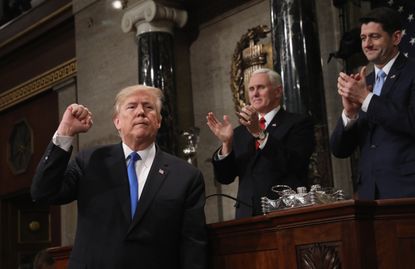Why Trump's first State of the Union speech will resonate with voters
Most State of the Union addresses come and go. This one might actually have staying power.


President Trump may have started his first official State of the Union address subdued in tone and waxing on about bipartisanship, but don't let that fool you. When he got to the meat of his wish list — immigration and defense spending — he made it clear that he intends to play hardball.
It may take days or weeks to fully unpack Trump's speech. It ran just over 80 minutes, making it one of the longest State of the Union addresses in modern times. Only Bill Clinton's sermons in 1995 and 2000 ran longer, at 85 and 89 minutes, respectively. As with almost all SOTU speeches, Trump's was a mix of self-congratulation, laundry listing, and anecdotes based on the guests in the gallery of the joint session of Congress. Nevertheless, it scored on several points, and may well have significant staying power, enough to sway the coming political battles in his favor.
One guest in particular may well have provided the image of the night: Trump introduced North Korean defector Ji Seong Ho and told the remarkable story of his escape to freedom. After collapsing from hunger on a set of train tracks, Ji was struck, and lost his leg. He used crutches to get out of North Korea and kept walking until he passed out of China and into freedom. Trump invited Ji to stand, and he lifted up the same crutches that took him out of tyranny.
Subscribe to The Week
Escape your echo chamber. Get the facts behind the news, plus analysis from multiple perspectives.

Sign up for The Week's Free Newsletters
From our morning news briefing to a weekly Good News Newsletter, get the best of The Week delivered directly to your inbox.
From our morning news briefing to a weekly Good News Newsletter, get the best of The Week delivered directly to your inbox.
Ji's story came at the end of a series of calls Trump made for investing more heavily in defense. He argued that a weak military "is the surest way to conflict," while "unmatched power" was the only way to provide a reliable defense. He challenged Congress to end the defense sequester on behalf of "our great military" and to allow the U.S. to keep fighting terrorism abroad.
But it was North Korea that occupied most of his defense plea. Trump used Ji's story to underpin his argument that the regime of Kim Jong Un poses a special kind of threat to American and global security, as "no regime has oppressed its own citizens more totally or brutally." The story of Ji and the death of American student Otto Warmbier, whose parents also were in attendance as Trump's guests, showed "the depraved character of the North Korean regime" and demonstrated what would happen if Kim achieved his goals of creating nuclear weapons that could reach the American homeland. That line, attached to Trump's demand to eliminate the funding restrictions that have hampered American readiness, will likely resonate with voters — especially after the false missile alert in Hawaii earlier this month.
On immigration, Trump played an even tougher version of hardball. Prior to the speech, many expected to hear a theme of conciliation, an effort to reach across the aisle to solve the debate over how to handle DREAMers — undocumented immigrants brought into the country illegally as children. Instead, Trump went the opposite direction. He spoke of the threat of gangs crossing the border, the scourge of the opioid-addiction epidemic, and the dangers for Border Patrol and ICE personnel dealing with an insecure border.
Again, Trump had guests on hand to underscore his point. He introduced two families whose daughters had been murdered by members of the Central American gang MS-13, a major talking point for border hawks. "These two precious girls were brutally murdered while walking together in their hometown," Trump explained while the parents wept in the gallery. "Six members of the savage MS-13 gang have been charged with Kayla and Nisa's murders." Afterward, he introduced a Homeland Security investigator whose task force has rounded up hundreds of illegal immigrant gang members to emphasize the ongoing nature of the threat. "Tonight, I am calling on the Congress to finally close the deadly loopholes that have allowed MS-13, and other criminals gangs, to break into our country," Trump declared.
Then, he flipped the script on the use of the word "DREAMers" for DACA recipients. "The sacred duty of every elected official in this chamber is to defend Americans," Trump intoned, "to protect their safety, their families, their communities, and their right to the American dream. Because Americans are dreamers, too."
Trump then outlined his "four pillars" for immigration reform. This plan sounded very familiar, because it was exactly what the White House published last week. Rather than signal any flexibility on those points, Trump instead said they were a "down-the-middle compromise … that puts America first."
Most State of the Union speeches come and go. Very little gets remembered for long, as other priorities overtake the White House and Congress. The visuals in Trump's speech, however, may be more enduring, especially when it comes to immigration. Democrats may want to think about taking a significant concession on the path to citizenship for DACA recipients and getting that issue off the table as soon as possible.
To some extent, at significant events like this, Trump succeeds by not failing. His well-earned reputation as a rhetorical loose cannon sets expectations lower than usual, but that belies his preparation for major traditional speeches. It happened in Davos last week and again last night. Congress may not want to admit it, but Trump outplayed them, just as he managed to do with the shutdown a little over a week earlier.
Sign up for Today's Best Articles in your inbox
A free daily email with the biggest news stories of the day – and the best features from TheWeek.com
Edward Morrissey has been writing about politics since 2003 in his blog, Captain's Quarters, and now writes for HotAir.com. His columns have appeared in the Washington Post, the New York Post, The New York Sun, the Washington Times, and other newspapers. Morrissey has a daily Internet talk show on politics and culture at Hot Air. Since 2004, Morrissey has had a weekend talk radio show in the Minneapolis/St. Paul area and often fills in as a guest on Salem Radio Network's nationally-syndicated shows. He lives in the Twin Cities area of Minnesota with his wife, son and daughter-in-law, and his two granddaughters. Morrissey's new book, GOING RED, will be published by Crown Forum on April 5, 2016.
-
 Can AI tools be used to Hollywood's advantage?
Can AI tools be used to Hollywood's advantage?Talking Points It makes some aspects of the industry faster and cheaper. It will also put many people in the entertainment world out of work
By Anya Jaremko-Greenwold, The Week US Published
-
 'Paraguay has found itself in a key position'
'Paraguay has found itself in a key position'Instant Opinion Opinion, comment and editorials of the day
By Justin Klawans, The Week US Published
-
 Meet Youngmi Mayer, the renegade comedian whose frank new memoir is a blitzkrieg to the genre
Meet Youngmi Mayer, the renegade comedian whose frank new memoir is a blitzkrieg to the genreThe Week Recommends 'I'm Laughing Because I'm Crying' details a biracial life on the margins, with humor as salving grace
By Scott Hocker, The Week US Published
-
 US election: who the billionaires are backing
US election: who the billionaires are backingThe Explainer More have endorsed Kamala Harris than Donald Trump, but among the 'ultra-rich' the split is more even
By Harriet Marsden, The Week UK Published
-
 US election: where things stand with one week to go
US election: where things stand with one week to goThe Explainer Harris' lead in the polls has been narrowing in Trump's favour, but her campaign remains 'cautiously optimistic'
By Harriet Marsden, The Week UK Published
-
 Is Trump okay?
Is Trump okay?Today's Big Question Former president's mental fitness and alleged cognitive decline firmly back in the spotlight after 'bizarre' town hall event
By Harriet Marsden, The Week UK Published
-
 The life and times of Kamala Harris
The life and times of Kamala HarrisThe Explainer The vice-president is narrowly leading the race to become the next US president. How did she get to where she is now?
By The Week UK Published
-
 Will 'weirdly civil' VP debate move dial in US election?
Will 'weirdly civil' VP debate move dial in US election?Today's Big Question 'Diametrically opposed' candidates showed 'a lot of commonality' on some issues, but offered competing visions for America's future and democracy
By Harriet Marsden, The Week UK Published
-
 1 of 6 'Trump Train' drivers liable in Biden bus blockade
1 of 6 'Trump Train' drivers liable in Biden bus blockadeSpeed Read Only one of the accused was found liable in the case concerning the deliberate slowing of a 2020 Biden campaign bus
By Peter Weber, The Week US Published
-
 How could J.D. Vance impact the special relationship?
How could J.D. Vance impact the special relationship?Today's Big Question Trump's hawkish pick for VP said UK is the first 'truly Islamist country' with a nuclear weapon
By Harriet Marsden, The Week UK Published
-
 Biden, Trump urge calm after assassination attempt
Biden, Trump urge calm after assassination attemptSpeed Reads A 20-year-old gunman grazed Trump's ear and fatally shot a rally attendee on Saturday
By Peter Weber, The Week US Published